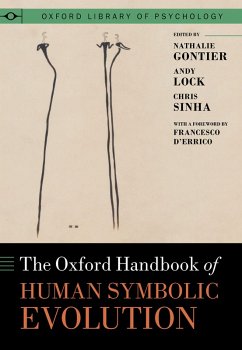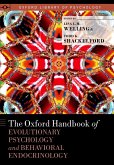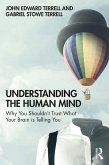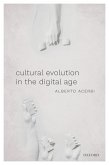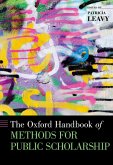

Alle Infos zum eBook verschenken

- Format: ePub
- Merkliste
- Auf die Merkliste
- Bewerten Bewerten
- Teilen
- Produkt teilen
- Produkterinnerung
- Produkterinnerung

Hier können Sie sich einloggen

Bitte loggen Sie sich zunächst in Ihr Kundenkonto ein oder registrieren Sie sich bei bücher.de, um das eBook-Abo tolino select nutzen zu können.
The biological and neurological capacity to symbolize, and the products of behavioral, cognitive, sociocultural, linguistic, and technological uses of symbols (symbolism), are fundamental to every aspect of human life. The Oxford Handbook of Human Symbolic Evolution explores the origins of our characteristically human abilities - our ability to speak, create images, play music, and read and write. The book investigates how symbolization evolved in human evolution and how symbolism is expressed across the various areas of human life. The field is intrinsically interdisciplinary - considering…mehr
- Geräte: eReader
- mit Kopierschutz
- eBook Hilfe
- Größe: 81.94MB
![The Oxford Handbook of Evolutionary Psychology and Behavioral Endocrinology (eBook, ePUB) The Oxford Handbook of Evolutionary Psychology and Behavioral Endocrinology (eBook, ePUB)]() The Oxford Handbook of Evolutionary Psychology and Behavioral Endocrinology (eBook, ePUB)90,95 €
The Oxford Handbook of Evolutionary Psychology and Behavioral Endocrinology (eBook, ePUB)90,95 €![Chimpanzees, War, and History (eBook, ePUB) Chimpanzees, War, and History (eBook, ePUB)]() R. Brian FergusonChimpanzees, War, and History (eBook, ePUB)33,95 €
R. Brian FergusonChimpanzees, War, and History (eBook, ePUB)33,95 €![Survival of the Virtuous (eBook, ePUB) Survival of the Virtuous (eBook, ePUB)]() Dennis L. KrebsSurvival of the Virtuous (eBook, ePUB)38,95 €
Dennis L. KrebsSurvival of the Virtuous (eBook, ePUB)38,95 €![Understanding the Human Mind (eBook, ePUB) Understanding the Human Mind (eBook, ePUB)]() John TerrellUnderstanding the Human Mind (eBook, ePUB)44,95 €
John TerrellUnderstanding the Human Mind (eBook, ePUB)44,95 €![Cultural Evolution in the Digital Age (eBook, ePUB) Cultural Evolution in the Digital Age (eBook, ePUB)]() Alberto AcerbiCultural Evolution in the Digital Age (eBook, ePUB)27,95 €
Alberto AcerbiCultural Evolution in the Digital Age (eBook, ePUB)27,95 €![The Oxford Handbook of the Psychology of Competition (eBook, ePUB) The Oxford Handbook of the Psychology of Competition (eBook, ePUB)]() The Oxford Handbook of the Psychology of Competition (eBook, ePUB)84,95 €
The Oxford Handbook of the Psychology of Competition (eBook, ePUB)84,95 €![The Oxford Handbook of Methods for Public Scholarship (eBook, ePUB) The Oxford Handbook of Methods for Public Scholarship (eBook, ePUB)]() The Oxford Handbook of Methods for Public Scholarship (eBook, ePUB)107,95 €
The Oxford Handbook of Methods for Public Scholarship (eBook, ePUB)107,95 €-
-
-
Dieser Download kann aus rechtlichen Gründen nur mit Rechnungsadresse in A, B, BG, CY, CZ, D, DK, EW, E, FIN, F, GR, HR, H, IRL, I, LT, L, LR, M, NL, PL, P, R, S, SLO, SK ausgeliefert werden.
- Produktdetails
- Verlag: Oxford University Press
- Seitenzahl: 1128
- Erscheinungstermin: 17. Januar 2024
- Englisch
- ISBN-13: 9780192543516
- Artikelnr.: 69800401
- Verlag: Oxford University Press
- Seitenzahl: 1128
- Erscheinungstermin: 17. Januar 2024
- Englisch
- ISBN-13: 9780192543516
- Artikelnr.: 69800401
Topics and Debates in Human Symbolic Evolution
* PART 1: Studying symbolism: Epistemological considerations
* 2: Nathalie Gontier: The evolution of the biological sciences
* 3: Nathalie Gontier: The evolution of the symbolic sciences
* 4: Ian Tattersall: A timeline for the acquisition of symbolic
cognition in the human lineage
* 5: Ana Majkic: Behavioral modernity, evolutionary synergies, and the
symbolic species
* 6: Michael A. Arbib: On the aboutness of language and the evolution
of the construction-ready brain
* 7: Antonio Benítez-Burraco and Dan Dediu: The evolution of language
and speech: What we know from genetics
* PART 2: Pathways to symbolization: Psychological considerations
* 8: Francesco Suman: The evolution of the human life course: The role
of culturally driven plasticity
* 9: Chris Sinha: Artefacts, symbols, and the socio-cultural dynamics
of niche construction
* 10: Peter Gärdenfors and Anders Högberg: Evolution of intentional
teaching
* 11: Nick J. Enfield and Jack Sidnell: Intersubjectivity is activity
plus accountability
* 12: Camilla Power, Ian Watts, and Chris Knight: The symbolic
revolution: A sexual conflict model
* 13: Maria Botero: Primate parents: Theories, bias, and change in the
study of the evolution of parenting
* PART 3: Symbolic lifeways: Anthropological considerations
* 14: Elisabeth V. Culley and Iain Davidson: Art, sign, and
representation
* 15: Antonis Iliopoulos and Lambros Malafouris: Symbols and material
signs in the debate on human origins
* 16: April Nowell and Amanda Cooke: Culturing the Paleolithic body:
Archaeological signatures of adornment and body modification
* 17: Rupert Till: The evolution of music: The development of sonic
representation and meaning
* 18: Fabio Silva, Fernando Pimenta, and Luís Tirapicos: Symbolism and
archeoastronomy in prehistory
* 19: Roslyn M. Frank: Exploring the evolutionary pathways from number
sense to numeracy
* PART 4: Grounding symbolism: Ethological considerations
* 20: Guenther Witzany: How viruses made us human
* 21: Ulrike Griebel and D. Kimbrough Oller: Animal signals and
symbolism
* 22: Augusta Gaspar: Emotion expression, empathic reception, and
prosocial behavior: Are they linked in evolution?
* 23: David A. Leavens and Kim A. Bard: Primate cognition in captivity
* 24: Heidi Lyn: Kanzi or can't he? Animal language projects
* 25: Lana M. Ruck and Natalie T. Uomini: Artifact, praxis, tool, and
symbol
* PART 5: From protolanguage to language: Linguistic considerations
* 26: Francesco Ferretti: The narrative origins of language
* 27: Slawomir Wacewicz and Przemyslaw Zywiczynski: Pantomimic
conceptions of language origins
* 28: Tania Kuteva and Bernd Heine: On the structure of early language:
Analytic vs holistic language processing and grammaticalization
* 29: Susan Goldin-Meadow: Gesture is an intrinsic part of modern-day
human communication and may always have been so
* 30: Ulf Liszkowski and Johanna Rüther: Ontogenetic origins of infant
pointing
* 31: Gerd Carling, Chundra Cathcart, and Erich Round: Reconstructing
the origins of language families and variation
* PART 6: Expanding symbolism: Socio-technological considerations
* 32: Todd Oakley: The origins of money and its role in modernity
* 33: Prem Poddar: Force fields of the modern: the symbolic
contestation of power
* 34: Alex de Voogt: The evolution of writing systems: An introduction
* 35: Rukmini Bhaya Nair: Archewriting: The Symbolic Evolution of
Script and Narrative
* 36: Sverker Johansson and Ylva Lindberg: Cybercultures
* 37: Francis Heylighen: Transcending the rational symbol system: How
information and communication technology integrates science, art,
philosophy, and spirituality into a global brain
* 38: Natasha Vita-More: 1. Technoscience, transhumanism, and telos
* 39: Chris Sinha: Metaphor, myth, and symbol in the grain of time
Topics and Debates in Human Symbolic Evolution
* PART 1: Studying symbolism: Epistemological considerations
* 2: Nathalie Gontier: The evolution of the biological sciences
* 3: Nathalie Gontier: The evolution of the symbolic sciences
* 4: Ian Tattersall: A timeline for the acquisition of symbolic
cognition in the human lineage
* 5: Ana Majkic: Behavioral modernity, evolutionary synergies, and the
symbolic species
* 6: Michael A. Arbib: On the aboutness of language and the evolution
of the construction-ready brain
* 7: Antonio Benítez-Burraco and Dan Dediu: The evolution of language
and speech: What we know from genetics
* PART 2: Pathways to symbolization: Psychological considerations
* 8: Francesco Suman: The evolution of the human life course: The role
of culturally driven plasticity
* 9: Chris Sinha: Artefacts, symbols, and the socio-cultural dynamics
of niche construction
* 10: Peter Gärdenfors and Anders Högberg: Evolution of intentional
teaching
* 11: Nick J. Enfield and Jack Sidnell: Intersubjectivity is activity
plus accountability
* 12: Camilla Power, Ian Watts, and Chris Knight: The symbolic
revolution: A sexual conflict model
* 13: Maria Botero: Primate parents: Theories, bias, and change in the
study of the evolution of parenting
* PART 3: Symbolic lifeways: Anthropological considerations
* 14: Elisabeth V. Culley and Iain Davidson: Art, sign, and
representation
* 15: Antonis Iliopoulos and Lambros Malafouris: Symbols and material
signs in the debate on human origins
* 16: April Nowell and Amanda Cooke: Culturing the Paleolithic body:
Archaeological signatures of adornment and body modification
* 17: Rupert Till: The evolution of music: The development of sonic
representation and meaning
* 18: Fabio Silva, Fernando Pimenta, and Luís Tirapicos: Symbolism and
archeoastronomy in prehistory
* 19: Roslyn M. Frank: Exploring the evolutionary pathways from number
sense to numeracy
* PART 4: Grounding symbolism: Ethological considerations
* 20: Guenther Witzany: How viruses made us human
* 21: Ulrike Griebel and D. Kimbrough Oller: Animal signals and
symbolism
* 22: Augusta Gaspar: Emotion expression, empathic reception, and
prosocial behavior: Are they linked in evolution?
* 23: David A. Leavens and Kim A. Bard: Primate cognition in captivity
* 24: Heidi Lyn: Kanzi or can't he? Animal language projects
* 25: Lana M. Ruck and Natalie T. Uomini: Artifact, praxis, tool, and
symbol
* PART 5: From protolanguage to language: Linguistic considerations
* 26: Francesco Ferretti: The narrative origins of language
* 27: Slawomir Wacewicz and Przemyslaw Zywiczynski: Pantomimic
conceptions of language origins
* 28: Tania Kuteva and Bernd Heine: On the structure of early language:
Analytic vs holistic language processing and grammaticalization
* 29: Susan Goldin-Meadow: Gesture is an intrinsic part of modern-day
human communication and may always have been so
* 30: Ulf Liszkowski and Johanna Rüther: Ontogenetic origins of infant
pointing
* 31: Gerd Carling, Chundra Cathcart, and Erich Round: Reconstructing
the origins of language families and variation
* PART 6: Expanding symbolism: Socio-technological considerations
* 32: Todd Oakley: The origins of money and its role in modernity
* 33: Prem Poddar: Force fields of the modern: the symbolic
contestation of power
* 34: Alex de Voogt: The evolution of writing systems: An introduction
* 35: Rukmini Bhaya Nair: Archewriting: The Symbolic Evolution of
Script and Narrative
* 36: Sverker Johansson and Ylva Lindberg: Cybercultures
* 37: Francis Heylighen: Transcending the rational symbol system: How
information and communication technology integrates science, art,
philosophy, and spirituality into a global brain
* 38: Natasha Vita-More: 1. Technoscience, transhumanism, and telos
* 39: Chris Sinha: Metaphor, myth, and symbol in the grain of time
